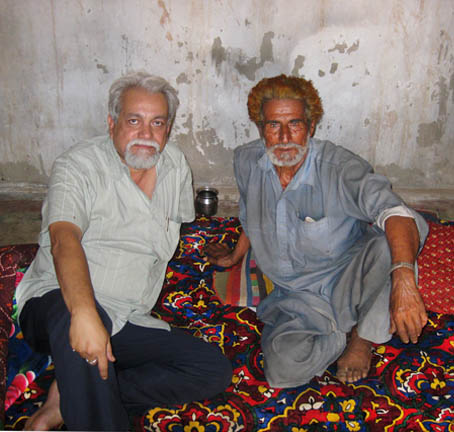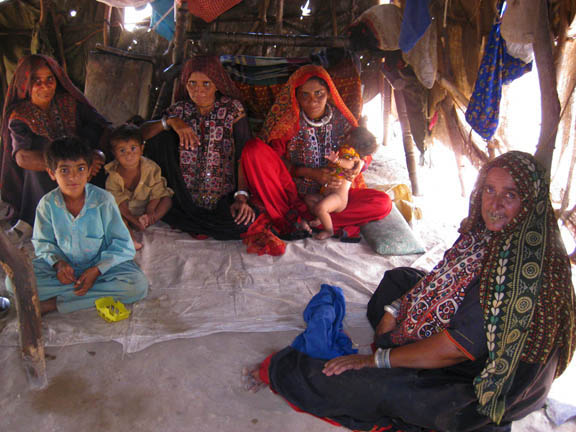Music From The Edge by Randhir Khare
Folk musicians from Kutch (in Gujarat) have the odds stacked against them. Not only do most of them belong to marginal communities but they also play instruments that aren’t respected any more.
Randhir Khare is a celebrated Indian poet, writer, artist, folklorist and teacher who is the recipient of numerous awards and honours and a visionary mentor to new writers in the sub-continent. He is presently writing his memoirs – One Life Is Not Enough. He is also a Founding contributor of Live Encounters Magazine
www.facebook.com/randhir.khare25
https://randhirkhareblog.wordpress.com/
www.gyaanadab.org
www.randhirkhare.in

Most traditional Kutchi folk musicians are victims of humiliation, exploitation and neglect… creative fulfilment being their sole reward. Even under the Raos and other royalty, support and encouragement was extended only to those who were in favour. The others were forced to eke out a living by performing at community gatherings, festivals, and religious celebrations and on occasions in the homes of those who had specially hired their services. They had to, even in those times, supplement their earnings by working on their own land, grazing their herds and flocks, working as hired hands or developing other popular-craft skills. But integration with the Indian Union after Independence began to throw up a whole new set of demands and challenges – rapid urbanisation, the incursion of non-Kutchis into the region and increasing commercialism which affected not merely the social and economic life but also culture and entertainment were among the new pressures. Power and control that was once only enjoyed by landed families and royalty was wholly given over to a plethora of new holders, including businessmen, politicians, bureaucrats, armed forces and security personnel and a number of old and new landed families. Add to the list the long arms of international and national cultural bodies and agencies, the music, film and television industries and innumerable individuals who, in the name of culture carry away valuable recordings, after paying musicians a pittance.
The Festivals of India, which showcased the ‘culture of India abroad’, picked up a few musicians from Kutch, displayed them like performing fleas and then dropped them back into their homes so that they could continue to grovel for survival. It must have been a disorientating experience for many of them. After being feted in the world outside, returning to a life bereft of hope became even more difficult. Follow-up support by Government agencies for the chosen ones and others has been grossly insubstantial.
Many of the new masters have been known to use their influence and public positions to make musicians perform at marriages, birthdays, official and semi-official gatherings, give them a meal and send them home without paying them even a rupee. The musicians do not complain because they innocently hold on to the hope that some day they will be able to get a favour or two in exchange for the performance. Expectedly, the favours are never forthcoming.
The tendency to under-value traditional folk music in Kutch is growing at an appalling rate and the new masters often imagine that they are doing the musicians a favour by inviting them to perform. Like the master murli player Surath Nath who died of cold and over exposure to the inclement winter of Banni because he was forced to perform at the government sponsored arts festival to attract tourists – even though he was already very ill. No one seemed to care for the master musician’s health. All they wanted was that he perform. Ironically, officialdom doesn’t care a damn for the pitiful state of the Vaghdis (Surat Nath’s community) a nomadic peole but they wouldn’t think twice to crucify one of their accomplished elders.
Of course he’s just one of the many other musicians from traditional community who has got a raw deal. There’s also Siddique Mitha Jath, master of the Surando, a stringed folk instrument in the shape of a peacock which originated in Sind and Baluchistan. He ended up doing a menial job in Ahmedabad. Then there’s also the Borrindo maker and player who is the young potter Osmangani Kumbhar, grandson of the famed potter Buddhachacha Umar Kumbhar.
One of the few surviving music masters is Musa Gulam Jath, a Maldhari or cattle herder who lives on the lip of the Great Rann of Kutch. He plays the Jodia Pawa, a double flute. I remember the first time I heard him play at a someone’s residence in Bhuj, the district headquarters of Kutch (in Gujarat). I was given the rare opportunity to experience the triumph of the creative spirit over the vicissitudes of injustice and misfortune. A musician, powered by his talent and tradition, rising out of the difficulties in his personal life to play music that was inspirational. It was both stimulating and humbling.
His son was in hospital, his wife seriously ill, his cattle had perished and prospects of farm labour had dwindled due to incessant drought, the roof of his house had collapsed in a storm and he had just about got himself out of a scrape with the security forces who had picked him up while he was grazing someone else’s cattle on the border, suspecting him to be an ‘enemy’ infiltrator. I’d imagined that he’d be so weighed down that he’d hardly be in any position to even hold a conversation with us. He didn’t do just that but also shared the music he made on his Jodiya Pawa.
As the notes poured out from the double flute and filled the room, I shut my eyes and wandered out into the Bhuj air and away northwards till I reached the rolling grasslands of Banni, then on to the Rann and across…below me the land was cracked, blistered, dusty and pitiless, around me the air was cool and flocks of migratory birds glided passed towards a blue horizon…I don’t know how many lands I passed, how many borders, how many lives…all I know is that I was filled with the strength and wonder of those notes…when I returned, I found myself crying.
When the notes settled around us, we waited in silence for a few moments and then I stood up and left the room. The intensity in the air was more than I could handle.
Musa Gulam Jat joined me sometime later. ‘Have you heard anyone playing a Jodiya Pawa before this?’ He asked, breaking the stillness between us.
‘No.’
He began speaking as if he was setting a message out in a bottle to sea, hoping it would be picked up by someone, somewhere…

‘This is my life,’ he said, tapping the double flute. ‘It’s more precious to me than anything else in the world. It keeps me alive. Without this I’d be nothing, no one. So let me tell you about this that is so precious to me…see, one is the male and is called the Nar and the other is the female and is called Madi. The nar keeps the sur and the Madi plays the melody. Together they make the music of the spirit…the music of the desert shepherds who brought this instrument from Sind when they crossed the border to India from Pakistan. That was a long time ago. In those days there were no borders and shepherds could travel with their flocks. Today, borders have divided people…sometimes I wonder, where do I belong? Whether I am that side of the border or this side, my lot will be the same. So it isn’t the question of whether I’m rich or poor. I belong where my family is, my music is. There is no dignity in being a Jath. No one cares for our community and the pitiful way in which we live. You have to come and see for yourself. When there’s a storm or it rains heavily, the roof over our heads is knocked down.’
And the message unravelled, about how he learnt the Jodiya Pawa from his father when he was fourteen, the years spent playing whilst he herded cattle, at fairs, on feast days, in melas… then out to perform in Ahmedabad, Gandhinagar, Pune, Nagpur, Mumbai, Bangalore, Delhi. It was curiosity and not appreciation that greeted him wherever he went because his instrument was an oddity, his music quaint. Neither fitted into the changing needs of his audiences. It was his performances in England, France and Germany that opened new possibilities for him. ‘They may not have known all about the raags I played, but they liked the music, listened with respect. I felt I was being appreciated as a folk musician there. I was somebody.’
Those were real moments of sharing we spent together before the everydayness of survival took over again and he went away, leaving me with the message in the bottle and a night sky that was crowded with stars.
In the years that followed, Musa and I became good friends and I visited him in his makeshift home in Dayapar, near the Great Rann. The moments we shared were precious, the tea black, strong and sweet and the smell of dung hung in the air. In the home of the Master, the silences were filled with fellowship. Outside and far away, the winds came and went from the Great Rann, circling hysterically in the dusty spaces above.
At Dayapar For Musa Gulam Jath
The moon dissolves over the Rann,
Reborn as jackal yaps –
Hard-toothed, bone-breaking,
Moving in the wind –
Smelling of centuries,
Heavy with wandering caravans
Of history, sea skeletons,
Dead memory of dolphins,
Seahorses and pearls now dust
Clenched in fists of salt.
The moon dissolves over the Rann
And I turn to you and ask,
‘Which is the path homewards
To remembrance
Where we will find ourselves again
As brother Maldharis?
Where is the vortex of belonging
Where the departed sit in silence
Listening to the moon speak
In the movements of time?’
You stare out into the dark
Until jackal yaps dissolve
Into the effulgence of time
And light shreds dreams
© Randhir Khare



One Reply to “Randhir Khare – Music From The Edge”